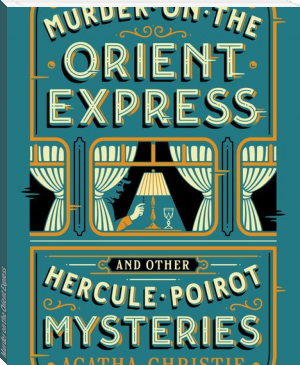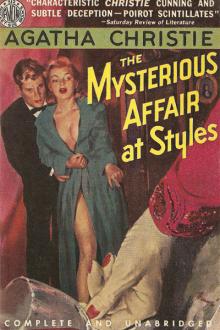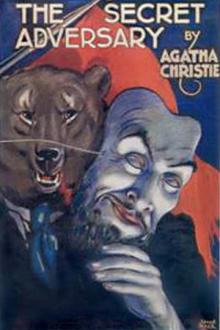Murder on the Orient Express - Agatha Christie (always you kirsty moseley .TXT) 📗

- Author: Agatha Christie
Book online «Murder on the Orient Express - Agatha Christie (always you kirsty moseley .TXT) 📗». Author Agatha Christie
"So that you weren't alarmed when the morning wore on and no summons came?"
"No, sir."
"Did you know that your master had enemies?"
"Yes, sir." The man spoke quite unemotionally.
"How did you know?"
"I had heard him discussing some letters, sir, with Mr MacQueen."
"Had you an affection for your employer, Masterman?"
Masterman's face became, if possible, even more inexpressive than it was normally.
"I should hardly like to say that, sir. He was a generous employer."
"But you didn't like him?"
"Shall we put it that I don't care very much for Americans, sir?"
"Have you ever been in America?"
"No, sir."
"Do you remember reading in the paper of the Armstrong kidnapping case?"
A little colour came into the man's cheeks.
"Yes, indeed, sir. A little baby girl, wasn't it? A very shocking affair."
"Did you know that your employer, Mr Ratchett, was the principal instigator in that affair?"
"No, indeed, sir." The valet's tone held positive warmth and feeling for the first time. "I can hardly believe it, sir."
"Nevertheless, it is true. Now, to pass to your own movements last night. A matter of routine, you understand. What did you do after leaving your master?"
"I told Mr MacQueen, sir, that the master wanted him. Then I went to my own compartment and read."
"Your compartment was -"
"The end second-class one, sir. Next to the dining-car."
Poirot was looking at his plan.
"I see - and you had which berth?"
"The lower one, sir."
"That is No. 4?"
"Yes, sir."
"Is there anyone in with you?"
"Yes, sir. A big Italian fellow."
"Does he speak English?"
"Well, a kind of English, sir." The valet's tone was deprecating. "He's been in America - Chicago, I understand."
"Do you and he talk together much?"
"No, sir. I prefer to read."
Poirot smiled. He could visualize the scene - the large, voluble Italian, and the snub direct administered by the gentleman's gentleman.
"And what, may I ask, are you reading?" he inquired.
"At present, sir, I am reading Love's Captive, by Mrs Arabella Richardson."
"A good story?"
"I find it highly enjoyable, sir."
"Well, let us continue. You returned to your compartment and read Love's Captive till - when?"
"At about ten thirty, sir, this Italian wanted to go to bed. So the conductor came and made the beds up."
"And then you went to bed and to sleep?"
"I went to bed, sir, but I didn't sleep."
"Why didn't you sleep?"
"I had the toothache, sir."
"Oh, lа-lа - that is painful."
"Most painful, sir."
"Did you do anything for it?"
"I applied a little oil of cloves, sir, which relieved the pain a little, but I was still not able to get to sleep. I turned the light on above my head and continued to read - to take my mind off, as it were."
"And did you not go to sleep at all?"
"Yes, sir, I dropped off about four in the morning."
"And your companion?"
"The Italian fellow? Oh, he just snored."
"He did not leave the compartment at all during the night?"
"No, sir."
"Did you?"
"No, sir."
"Did you hear anything during the night?"
"I don't think so, sir. Nothing unusual, I mean. The train being at a standstill made it all very quiet."
Poirot was silent a moment or two. Then he spoke.
"Well, I think there is very little more to be said. You cannot throw any light upon the tragedy?"
"I'm afraid not. I'm sorry, sir."
"As far as you know, was there any quarrel or bad blood between your master and Mr MacQueen?"
"Oh! no, sir. Mr MacQueen was a very pleasant gentleman."
"Where were you in service before you came to Mr Ratchett?"
"With Sir Henry Tomlinson, sir, in Grosvenor Square."
"Why did you leave him?"
"He was going to East Africa, sir, and did not require my services any longer. But I am sure he will speak for me, sir. I was with him some years."
"And you have been with Mr Ratchett - how long?"
"Just over nine months, sir."
"Thank you, Masterman. By the way, are you a pipe-smoker?"
"No, sir. I only smoke cigarettes - gaspers, sir."
"Thank you, that will do."
Poirot gave him a nod of dismissal.
The valet hesitated a moment.
"You'll excuse me, sir, but the elderly American lady is in what I might describe as a state, sir. She's saying she knows all about the murderer. She's in a very excitable condition, sir."
"In that case," said Poirot, smiling, "we had better see her next."
"Shall I tell her, sir? She's been demanding to see someone in authority for a long time. The conductor's been trying to pacify her."
"Send her to us, my friend," said Poirot. "We will listen to her story now."
Chapter 4
THE EVIDENCE OF THE AMERICAN LADY
Mrs Hubbard arrived in the dining-car in such a state of breathless excitement that she was hardly able to articulate her words.
"Now just tell me this - who's in authority here? I've got some very important information, very important indeed, and I'm going to tell it to someone in authority just as soon as I can. If you gentlemen -"
Her wavering glance fluctuated between the three men. Poirot leaned forward.
"Tell it to me, Madame," he said. "But first, pray be seated."
Mrs Hubbard plumped heavily down on to the seat opposite to him.
"What I've got to tell you is just this. There was a murder on the train last night, and the murderer was right there in my compartment!"
She paused to give dramatic emphasis to her words.
"You are sure of this, Madame?"
"Of course I'm sure! The idea! I know what I'm talking about. I'll tell you everything there is to tell. I'd gotten into bed and gone to sleep, and suddenly I woke up - everything was dark - and I knew there was a man in my compartment. I was just so scared I couldn't scream, if you know what I mean. I just lay there and thought, 'Mercy, I'm going to be killed!' I just can't describe to you how I felt. These nasty trains, I thought, and all the outrages I'd read of. And I thought, 'Well, anyway, he won't get my jewellery' - because, you see, I'd put that in a stocking and hidden it under my pillow - which isn't any too comfortable, by the way; kinda bumpy, if you know what I mean. But that's neither here nor there. Where was I?"
"You realised, Madame, that there was a man in your compartment."
"Yes, well, I just lay there with my eyes closed, and wondered what I'd do. And I thought, well, I'm just thankful that my daughter doesn't know the plight I'm in. And then, somehow, I got my wits
about me and I felt about with my hand and I pressed the bell for the conductor. I pressed it and I pressed it, but nothing happened - and I can tell you, I thought my heart was going to stop beating. 'Mercy,' I said to myself, 'maybe they've murdered every single soul on the train.' It was at a standstill anyhow and there was a nasty quiet feel in the air. But I just went on pressing that bell and oh! the relief when I heard footsteps coming running down the corridor and a knock on the door! 'Come in,' I screamed, and I switched on the lights at the same time. And would you believe it, there wasn't a soul there!"
This seemed to Mrs Hubbard to be a dramatic climax rather than an anticlimax.
"And what happened next, Madame?"
"Why, I told the man what had happened and he didn't seem to believe me. Seemed to imagine I'd dreamed the whole thing. I made him look under the seat, though he said there wasn't room for a man to squeeze himself in there. It was plain enough that the man had got away - but there had been a man there, and it just made me mad the way the conductor tried to soothe me down! I'm not one to imagine things, Mr - I don't think I know your name?"
"Poirot, Madame; and this is M. Bouc, a director of the company, and Dr Constantine."
Mrs Hubbard murmured, "Pleased to meet you, I'm sure," to all three of them in an abstracted manner and then plunged once more into her recital.
"Now I'm just not going to pretend I was as bright as I might have been. I got it into my head that it was the man from next door - the poor fellow who's been killed. I told the conductor to look at the door between the compartments, and sure enough it wasn't bolted. Well, I soon saw to that. I told him to bolt it then and there, and after he'd gone out I got up and put a suitcase against it to make sure."
"What time was this, Mrs Hubbard?"
"Well, I'm sure I can't tell you. I never looked to see. I was so upset."
"And what is your theory now?"
"Why, I should say it was just as plain as plain could be. The man in my compartment was the murderer. Who else could he be?"
"And you think he went back into the adjoining compartment?"
"How do I know where he went? I had my eyes tight shut."
"He might have slipped out through the door into the corridor."
"Well, I couldn't say. You see, I had my eyes tight shut."
Mrs Hubbard sighed convulsively.
"Mercy, I was scared! If my daughter only knew -"
"You do not think, Madame, that what you heard was the noise of someone moving about next door - in the murdered man's compartment?"
"No, I do not, Mr - what is it? - Poirot. The man was right there in the same compartment with me. And what's more I've got proof of it."
Triumphantly, she hauled a large handbag into view and proceeded to burrow in its interior.
She took out in turn two large clean handkerchiefs, a pair of horn-rimmed glasses, a bottle of aspirin, a packet of Glauber's Salts, a celluloid tube of bright green peppermints, a bunch of keys, a pair of scissors, a book of American Express cheques, a snapshot of an extraordinarily plain-looking child, some letters, five strings of pseudo-Oriental beads, and a small metal object - a button.
"You see this button? Well, it's not one of my buttons. It's not off anything I've got. I found it this morning when I got up."
As she placed it on the table, M. Bouc leaned forward and gave an exclamation. "But this is a button from the tunic of a Wagon Lit attendant!"
"There may be a natural explanation for that," said Poirot.
He turned gently to the lady.
"This button, Madame, may have dropped from the conductor's uniform, either when he searched your cabin or when he was making the bed up last night."
"I just don't know what's the matter with all you people. Seems as though you don't want to do anything but make objections. Now listen here. I was reading a magazine last night before I went to sleep. Before I turned the light out, I placed





Comments (0)